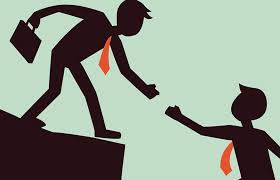The Trust Paradox of Poor Countries - Trust, GDP and Nationalism
- Martín Ramírez Ch.
- 8 abr 2017
- 7 Min. de lectura
Actualizado: 7 feb 2024

Trust generates cooperation between agents, and cooperation produces wealth. This is true for all nations and it is a basic consensus. As well, we would expect nationalism to reflect or produce trust. Yet this is not so, at least not for poor countries and less so for Ecuador.
What is nationalism? There is a variety of definitions, yet (ignoring all political ones) a simple, common and intuitive definition is "a special attachment to one's nation and all it's belongings". In my research the implications in this matter caught my interest and I have not found scientific research on it (to my knowledge extent). Its repercussions are important and its paradox is puzzling.
Nationalism (or the lack of it) has a direct relation with trust among countrymen. Intuitively, one would expect to find that the more nationalistic a population (to the anthem, the flag, food, countrymen) the more trust among the countrymen since quite possibly the most important component of a country is its people. As well, one would expect that generalized trust would produce cooperation between agents' (trust will move from a defect/defect position to a cooperate/cooperate outcome in a prisonners' dilemma) and this, in turn would produce wealth.
Knack, Putnam, Scott, are reknowned and have demonstrated that trust produces cooperation and it, will produce wealth. The same evidence and arguments have not been established for the relationship between nationalism and confidence. But, by common sense and intuitively, it is safe to assume that there is a direct relation between both. This is a fallacy, at least for the developing world. The more nationalism a country has, the less trust among people and the less wealth of the nation. This is true (even though there may be reverse causality between trust and nationalism). I will expand on the details with evidence.
In the World Values Surveys (2010-2014) many questions regarding perceptions are surveyed in approximately 60 countries. Among these, trust in strangers, in known people, generalized trust and the degree of nationalism are surveyed. As well, I used the real GDP per capita from 2015 from the World Bank. I ran regressions and have the following results:
Positive correlations between different types of TRUST and NATIONALISM (WVS 2010-2014) y real GDP 2015 (WB) - 60 countries

The results clearly show a positive correlation (0.54 coefficient) between the degree of generalized trust with per capita GDP. In addition I find that nationalism has inverse correlations (slightly weaker) with the different levels of trust. In summary GDP goes up when trust among people is high, but this is inverse to the level of nationalism.
This paradox, which I have called "The Trust Paradox of the Poor Countries" (lack of creativity I know) is puzzling and Ecuador is one of the countries which shows such behavior. In the following graph, I have selected certain countries where the blue bar shows nationalism, the green shows trust in foreigners, the orange trust in strangers, yellow is generalized trust and black shows real gdp per capita.
Trust, Nationalism (WVS 2010-2014) and real GDP 2015 (WB) - Selected countries

The sample includes high income nations like Sweden, Australia, USA, Netherlands and Germany, which show lower levels of nationalism than relatively poor countries like Chile, Colombia, Peru and Ecuador. All levels of trust are also higher for the high income countries and the inverse is true for poorer countries. Finally, ther is a non conclusive interisting result: poor countries show higher trust in strangers than generalized trust (orange versus yellow). This is different for all high income countries except USA.
Trust, is the essential ingredient for two people to cooperate (carry out business, colaborate, elaborate a product, a service, etc). Cooperation thus produces higher outcomes than the sum of the individual products, causing sinergy. This is why labor specialization exists and it is thanks to cooperation and trust. These variables, produce wealth and it is because it generates competitivity in companies, production processes, etc, thus increasing GDP. In Sweden, generalized trust has a 60% level, when in Ecuador it is of only 7%. Hence in comparison, Ecuador has costly transactions (in money and time) because each part must ensure the complying of the other part before complying theselves. The problematic reaches mass consumption, associates' entrepeneurships, partnerships, sales between companies, divorces, employee supervision, etc.
Such low intragroup trust (among people from the same tribe) is antinatural. It should've been evolutionarily eliminated. My older blogs explain that humans have naturally evolved to trust other inside a tribe and to distrust (at least in some degree) outsiders or strangers. This is so that they can produce food, shelter and security to try and reduce outsiders risks. It is also normal that in this population, there will be some distrustful people, defectors or free riders. But if the group becomes dominated by defectors then, by evolutionary group competition, that group would have been wiped out by homogenous groups of cooperators. Poor countries exactly show this trait, having a high percentage of defectors in it.
Many questions arise looking at such low generalized trust levels. Why does it show in poor countries and not in rich countries? Part of that answer I address it in my thesis at the right link, and it has to do with an imposible and silent xenocentristic desire to be part of a rich country (linking american fashion with status, food, cars evidences this). Partly, an acceptance of foreing prejudices play a role. But most importantly lack of punishment, spread and frecuency of corruption, play the major role. As well as having leaders exemplifying this traits. One may argue if a population selects a corrupt leader because the population is corrupt, or viceversa. The point is that the self perpetuating cycle goes on. All these variables promote distrust. Authorities can reverse this cycle, or make it worse, like dividing people by social classes, by political views, by religious views, by income or race. As well a libertarian capitalism will promote division in the population, because the rich get richer and the poor poorer, and the groups start to disagree on political views. In Ecuador, our president has done much to divide people, labeling them and degrading every opposition into inferior groups. Of course, Ecuador is multicultural and pluriethnic, and these makes it hard to trust between tribes, but punishment, institutionality and example will do much for augmenting trust.
What is going on with nationalism in poor countries? Why are most of the people positively nationalistic, but we do not trust the main component of a nation, its people? Ecuador is the 5th most nationalistic country out of 60 in the WVS with 98.5% of people answering they are positively nationalistic. Why are we so attached and proud of our country but barely trust our countrymen? Not trusting our countrymen means that we do not trust what is produced nationally, we do not trust ecuadorian manufacturers, we are very careful doing business between us, and this of course gives and advantage to foreign goods giving a push to imports. What are ecuadorians attached to if not to people? Well to the national anthem, to our soccer team (when we win) and I guess to Galapagos and ceviche. As I discussed in my thesis, the answer as to why this is so, may be related to ecuadorians suffering of "social creativity" which has to do with a sociological and psychological mechanism which emerges when people cannot switch groups to wealthier or classier ones. This is one of the bases for how xenocentrism comes to happen to individuals within a population. All of this as a consequence of the null mobility option between countries and a desire to denigrate national products in relation to foreign. Because of the incompatibility of the desire to identify oneself with a "better" country and limits to doing it, a dissonance between action and desire ocurr, which mostly leads to a complex, usually of inferiority.
The trust paradox of poor countries, is complex and its implications are powerful and tangible in the economic performance of different groups and nations and their overall growth and wealth. Of course, it not only happens between countries, groups have a very similar patter such as religious groups like jews, catholics. Other groups are of white, indegenous, black, etc. Showing ingroup bias is naturally evolved, that is why, as usually commented, jews are good at doing business with each other and having a tight community, based on trust and ingroup favoritism. All groups should have a large initial trust between members, and also show trust (careful and a bit more calculated) with outsiders.
In summary, it is good to trust foreigners for the exchange of goods, services, ideas and information. Yet it is ultra important to trust countrymen or ingroup members, especially of nations, because if not, then there is no advantage in being a gorup member. This will increase transaction costs between each interaction which are incurred to try and secure compliance of the other part. On the contrary, if people trust each other, competitiveness is gained in every product and service from the country, making exports much more competitive int he world. Nationalism on its part, has to be dealt with in poor countries. Communication, exemplifications and publicity has to be taken seriously so that in the future, being nationalistic means cooperating with our countrymen, being proud of it and leaving national symbols to what they are. Regarding how to start changing our culture of no cooperation, we should start by having effective and correct systems of justice. Justice is the provider of the punishment. Punishment will show people how not to.
It is important for authorities and civil population in general, to be aware of how much trust does countrymen put in countrymen, in poor countries this is not much and it is one of the basic trait a country used to produce in competitive market. FInally, people should punish all of the authorities whom capitalize on dividing the people from a country just to get the votes.




Comentarios